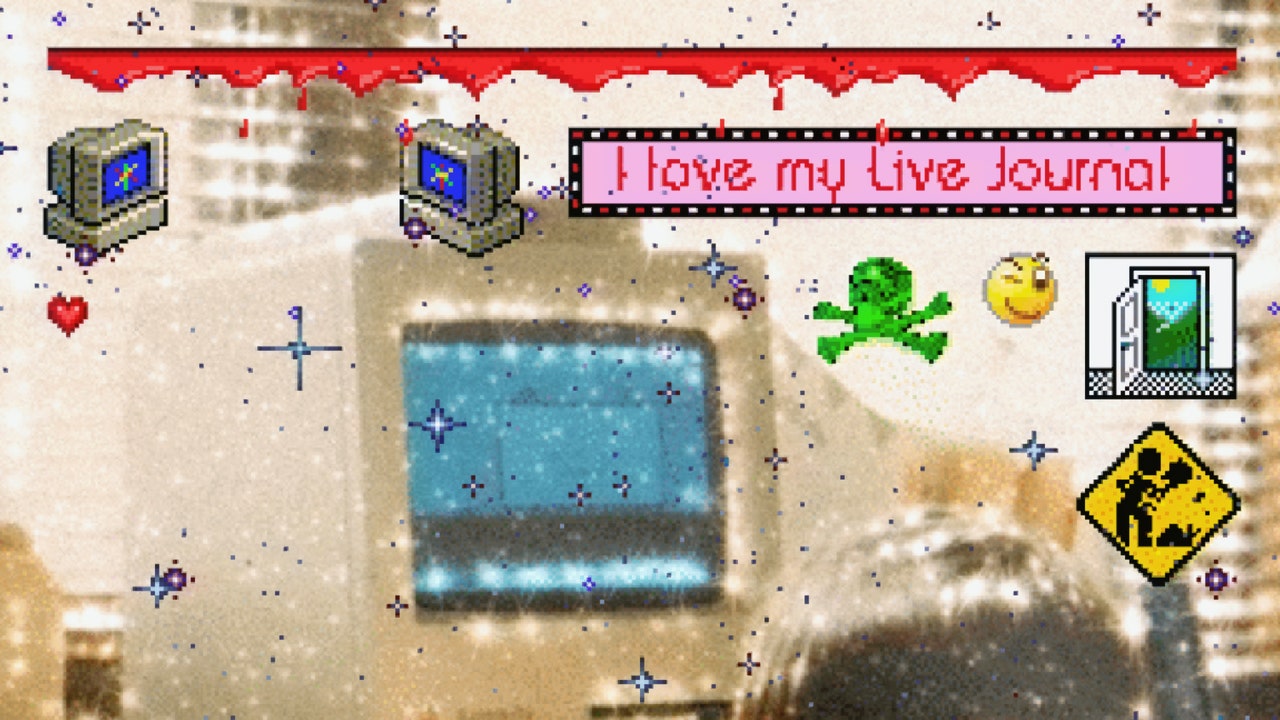OTHER
Coming of Age at the Dawn of the Social Internet

Like so many millennials, I entered the online world through AOL Instant Messenger. I created an account one unremarkable day in the late nineteen-nineties, sitting in the basement of my childhood home at our chunky white desktop computer, which connected to the Internet via a patchy dial-up modem. I picked a username, “Silk,” based on a character from my favorite series of fantasy novels, with asterisks and squiggles tacked on to differentiate my account from others who’d chosen to be Silks as well. The character in the books was a charismatic thief with a confidence that I, an awkward middle schooler, could only aspire to at the time. But the name was not intended as a cloak of anonymity, because most of the people I corresponded with on AIM were school friends whom I saw every day. Each evening, during my parentally allotted hour of screen time, I’d keep several different chats going simultaneously in separate windows, toggling among them when one person or another went AFK—“away from keyboard.” This was unavoidable in the age of dial-up, when the Internet connection would get disrupted any time a parent had to use the phone line. Being online wasn’t yet a default state of existence. You were either present on AIM, immersed in real time, or you weren’t.
There were strangers online, too, and kids venturing into AOL chat rooms could easily find themselves creeped on or misled. It would still be a few years before members of the boomer generation became fully aware of the risks of letting their children loose on the Internet. But for the moment, among my tween cohort, AOL Instant Messenger felt like a kind of alternative society to the one we inhabited in the physical world. Away messages, the brief customized notes that popped up when a user was idle, became a potent mode of self-expression. Quoting song lyrics was big—Blink-182’s “All the Small Things” seemed like the pinnacle of sophistication—but it was considered a faux pas to copy lyrics that a friend had already chosen. Spotting a copycat, one might make use of another classic AIM move, the passive-aggressive away-message update. “Are you going to be on AIM later?” was a common refrain at school. It meant something like “see you later”—on the Internet, where we were still ourselves but with a heady new sense of freedom.
My second home on the Internet was LiveJournal, an early online publishing platform. Rather than gossiping and dropping hints to one another in abstruse away messages, my friends and I wrote diary entries. Posts on L.J., as we called it, were visible to multiple people at once, so my writing there became a kind of public performance, a way of appearing more self-aware and eloquent than I was in person. Every evening, I trawled friends’ pages to see if they had posted and hoped that others were scoping mine in turn. One night, I stumbled upon the LiveJournal of a friend whom I hadn’t known kept an account on the site, and was mortified to discover that his most recent post criticized me by name. I had evidently complained about not being invited to a party, which the friend considered to be evidence of my jealous tendencies. I closed the Web browser before I could read any more, feeling foolish for not realizing that the kind of scrutiny I aimed outward in my online writings could be just as easily targeted at me.
A slightly older high-school friend named Parker, a budding graphic designer, had built a Web site for herself that included a section for blogging. L.J. allowed us to write about ourselves for an audience, but the nascent world of blogs seemed like something different—an adult pursuit, for those who presumably had something worth saying. (Little did we know. . . .) My friend’s site was personalized and elegant, with intricate HTML page structures and clickable art that she’d made herself in Photoshop, which was then easy to pirate online. She posted thoughts on the artists and bands that she liked. Her Web site seemed like a curated museum of the self, built up gradually and carefully. I was smitten with the site, but also, of course, with her.
I pestered Parker to make me a blog, too. She eventually agreed and hosted it as a subdomain on her own URL, which in retrospect was emblematic of the power dynamic between us. The site has been dead for years, but using the Internet Archive’s Wayback Machine I was recently able to dredge it back up. Reading the blog (which I had aptly titled Verbal Diarrhea) was endearing and excruciating at once. I published angsty screeds about the boredom I felt growing up in the Connecticut suburbs, marooned in the woods without a driver’s license. “I don’t have any mystery in my personal life, so I make it up,” I wrote in one post. Parker and I carried out arguments in the comment threads, just the two of us sniping back and forth, cryptically, perhaps on the off chance that someone else was reading. “You killed me in public,” one comment reads, referencing some now-forgotten high-school incident. Parker and I were critical of each other’s narcissism, the way we thought every sign in the world pointed back to ourselves—which was a feature of adolescence, sure, but also a habit encouraged by the Internet, which had given every one of us our own audience, actual or imagined.
I didn’t understand yet in middle school, but in the years that followed I began to think of my online presence as a shadow self. Those aware of it could see it, and I could see theirs—the reflection of their avatars and icons and away messages, the tone of their instant-message chats or L.J. posts. But, for other people who were not so online, it was still invisible, insignificant. I’ve been thinking a lot about this early version of my online self lately as I’ve been writing about latter-day digital culture and taking stock of just how much the landscape has changed. The so-called open Internet has consolidated today around a handful of platforms that serve users content according to the numbing logic of algorithmic recommendations and feeds. Passive consumption is encouraged. Every interaction is surveilled and commodified through targeted advertising.
It’s easy to be nostalgic for the way things were when you were a teen-ager. I grew up online, but time inevitably moved on, and younger generations have become the prime demographic for a new wave of technology. As the writer Max Read recently posited in the Times, perhaps millennials have simply aged out of the Internet. Still, I think something more fundamental has been lost for all of us as social media has evolved. It’s harder to find the spark of discovery, or the sense that the Web offers an alternate world of possibilities. Instead of each forging our own idiosyncratic paths online, we are caught in the grooves that a few giant companies have carved for us all.
Gradually, I realized that the Internet was not just a localized community of people I knew in person but a vaster civilization, with virtual cities full of other people constructing and managing their own shadow selves. Early in high school, I began playing Ragnarok Online, a Korean multiplayer role-playing video game that allowed me to commune with thousands of other users playing at the same time. The game, a predecessor to ones like World of Warcraft, turned the Internet’s burgeoning interactivity into full color, motion, and sound, literalizing the idea of a “virtual world.” I was hooked; there are years of my life from which I have more memories of playing Ragnarok than I do of going to school. Still sitting in the basement of my childhood home, I was now hanging out with people from all over the world. The players from Thailand often wrote “555” in the in-game chat room, which I eventually gathered was phonetic in Thai for “hahaha.”
During study-hall periods at school, I headed to the library or the computer lab and covertly logged in to Ragnarok discussion forums. Any time I see a color combination of green and gold, the pixelated design of a forum called Merchant Guild still flashes in my mind. What we’d now call being “extremely online” was still a clandestine activity for nerds; there was no social capital to be gained from a facility with the customs of the Web. Talking in the forums, to players I knew only by their pseudonyms and avatars, was the first time in my life that I felt like other people were interested in my opinions. I had developed unmistakable expertise in such matters as which monsters to hunt to gain “experience” points, or why thief characters should always equip themselves with daggers. (I didn’t say it was useful knowledge.) My online shadow self possessed a sense of authority and agency that I lacked elsewhere.
The Ragnarok forums sent me on my first trips down the online rabbit hole. The people I chatted with there would name-drop other sites that they frequented; exploring one led me to yet another. There was a forum about playing guitar (Ultimate Guitar) which sent me to one about the Dave Matthews Band (Ants Marching) and, soon enough, to one for disaffected Dave Matthews fans (UFCK, legendary for its cranks). Perhaps other teen-agers got the same feeling playing on a sports team, running drills or training in the gym together, experiences that I scrupulously avoided. I was inept, undisciplined, and unprepared for those collective activities—except online, where I didn’t need to exist in a body.
By the time I was finishing high school, the digital world I’d grown accustomed to was starting to transform. The proliferation of home Wi-Fi was making it easier to go online. Cell phones, like the 2004 Motorola Razr, became trendy accessories and promulgated the language of text messages—like AIM chats that you could hold in your palm. Social networks as we know them today were emerging. MySpace, which launched in 2003, was the first Web site that my IRL friends introduced me to, having caught wind of it from their elder siblings. (Friendster, MySpace’s predecessor, seemed to be for an older crowd.) When I made an account, I was surprised to find that MySpace tethered my shadow self to my physical person. I was no longer just a pseudonym and a cartoon avatar; the site asked for my actual name and a photo of my face; it told me to list my interests for everyone to see. Before, going online had felt like being a solo hiker, exploring unknown territories. Now I felt like I was putting out a billboard for myself on the highway.
MySpace linked the digital geography of the Internet to the offscreen world in other ways. You connected your account to your friends’ accounts by “friending” them, building a map of your preëxisting IRL relationships, and the site prompted you to choose a “Top Friends” ranking of eight people whose names appeared first in the list. The feature became a source of drama—picking someone for your Top selection was no guarantee that they would pick you—but this wasn’t a problem for me, since I didn’t have more than eight friends in school anyway. Looking back at my long-defunct MySpace page, now populated by broken images and empty frames, I found that I had only fifteen “connections” on the site, including MySpace Tom, the site’s co-founder and president, who was friends by default with everyone who joined.
Compared with the fragmented, D.I.Y. Web I knew, social media felt strangely predictable. User profiles on new sites like LinkedIn or Flickr were templated and surrounded by ads. They offered preset options from categories and drop-down menus—age, location, institutional affiliation—and quantified influence through friend and follower counts. The networks were no longer an escape from the power structures of the physical world but a way of reinforcing them. When Mark Zuckerberg started TheFacebook, as he initially called it, he allowed only Harvard students, then the rest of the Ivy League, to join. In the spring of 2006, all college students were invited, and I eagerly awaited an official e-mail address from the university I would be attending.


















